Leigh Brackett: “The Moon that Vanished”
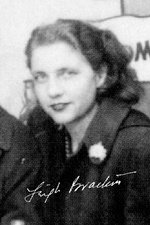 The great Leigh Brackett was born 100 years ago today. She put Adventure into planetary adventure the way few others did before or since, painting her settings with astonishing color and details that never detracted from the story. I’ve written about this in detail here, if you’re after a few samples of her prose and a light discussion of her technique.
The great Leigh Brackett was born 100 years ago today. She put Adventure into planetary adventure the way few others did before or since, painting her settings with astonishing color and details that never detracted from the story. I’ve written about this in detail here, if you’re after a few samples of her prose and a light discussion of her technique.
Today, though, hopefully you can join Bill Ward and me in celebrating Leigh Brackett by discussing one of her great stories, “The Moon that Vanished.” If you missed the announcement last week, you can still join in by grabbing a copy of the story inexpensively. You won’t regret it.
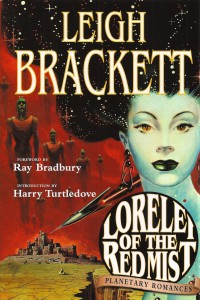 Howard: As usual, Brackett begins with the story already underway. And, as is often the case, I find it can only add to the enjoyment of a Brackett tale if you picture Humphrey Bogart as the main character, because the story is infused with the melancholy air of a great hardboiled story. Her characters are world-weary and damaged.
Howard: As usual, Brackett begins with the story already underway. And, as is often the case, I find it can only add to the enjoyment of a Brackett tale if you picture Humphrey Bogart as the main character, because the story is infused with the melancholy air of a great hardboiled story. Her characters are world-weary and damaged.
There is tension from the very start. Tension, and mystery. The questions about why this pathetic Heath fellow is here, and what others want with him is quickly followed by concerns about his own status as a protected pariah and what exactly that means. We learn, before long, when Heath demonstrates his power, but we don’t learn the how of his heartsickness — the means of Ethne’s death — only the implied why. A lesser writer would have slowed us down with the details at the start. Not Brackett. The missing backstory remains a hook pulling us forward.
Bill: And she continues to tease out the mystery right up until the point where Heath and company actually confront their goal. As this was my first time reading this story, I’ll attest she had my interest from the start. The nature of the Moonfire, Heath’s loss, and his strange powers and status, are doled out in small, and sometimes subtle, pieces.
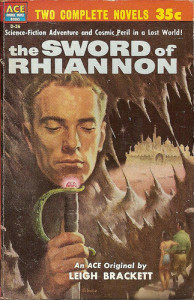 Howard: I love how she establishes atmosphere and setting at the same time she creates character, and sometimes a single word adds enough additional information to give you just a little more. For instance, “…where the captains and mates sat, playing their endless and complicated dice games…” We get a picture there not just of what they’re doing, but the manner in which they’re doing it, all with a few short words. But this is nothing compared to the full flower of her descriptive prose. When she wants to bring the poetry, she does it at the Chandler level. Here’s dawn over The Sea of Morning Opals:
Howard: I love how she establishes atmosphere and setting at the same time she creates character, and sometimes a single word adds enough additional information to give you just a little more. For instance, “…where the captains and mates sat, playing their endless and complicated dice games…” We get a picture there not just of what they’re doing, but the manner in which they’re doing it, all with a few short words. But this is nothing compared to the full flower of her descriptive prose. When she wants to bring the poetry, she does it at the Chandler level. Here’s dawn over The Sea of Morning Opals:
It came slowly, sifting down like a rain of jewels through the miles of pearl-grey cloud. Cool and slow at first, then warming and spreading, turning the misty air to drops of rosy fire, opaline, glowing, low to the water, so that the little ship seemed to be drifting through the heart of a fire-opal as vast as the universe.
The sea turned color, from black to indigo streaked with milky bands. Flights of the small bright dragons rose flashing from the weed-beds that lay scattered on the surface in careless patterns of purple and ochre and cinnabar and the weed itself sired with dim sentient life, lifting its tendrils to the light.
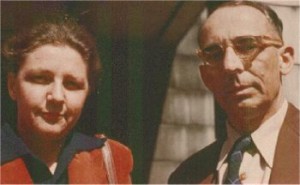 Bill: I was struck by how colorful and vivid her descriptions were, but she never oversells it or gets purple. Her prose is concise, but you’d never call it barebones. Even when the pace increases to a fast clip, she’s in control.
Bill: I was struck by how colorful and vivid her descriptions were, but she never oversells it or gets purple. Her prose is concise, but you’d never call it barebones. Even when the pace increases to a fast clip, she’s in control.
Howard: Absolutely. And how about how she describes Alor? Some writers are enormously adept at creating a crystal clear image of a person so that you’re probably imagining exactly what they envisioned. This was one of Ian Fleming’s greatest gifts. Brackett’s capable of that, but she also can do this, presenting a character through feeling. And damn, but this is great stuff. Here’s a sober Heath really looking at Alor for the first time:
His eyes were on the woman. She was tall but not too tall, young but not too young. Her body was everything a woman’s body ought to be, of its type, which was wide-shouldered and leggy, and she had a fine free way of moving it. She wore a short tunic of undyed spider silk, which exactly matched the soft curling hair that fell down her back — a bright, true silver with little peacock glints of color in it.
Her face was one that no man would forget in a hurry. It was a face shaped warmly and generously for all the womanly things — passion and laughter and tenderness. But something had happened to it. Something had given it a bitter sulky look. There was resentment in it and deep anger and hardness — and yet, with all that, it was somehow a pathetically eager face with lost and frightened eyes.
Heath remembered a day when he would have liked to solve the riddle of that contradictory face. A day, long ago, before Ethne came.
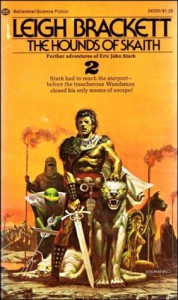 When I read the best of Brackett I feel like she’s taking me to school. That’s just some grand writing. Of course, she doesn’t do that with every character — that would get boring, fast. But here, with Heath’s future love interest, we see her described in a way that lets us finish the details. And note how in the end it still has mystery pulling us forward.
When I read the best of Brackett I feel like she’s taking me to school. That’s just some grand writing. Of course, she doesn’t do that with every character — that would get boring, fast. But here, with Heath’s future love interest, we see her described in a way that lets us finish the details. And note how in the end it still has mystery pulling us forward.
Bill: And she’s also telling us something about Heath as she describes Alor from his perspective, only reinforcing the feeling that there are no words wasted in this story. Brackett does the same in describing the specific brand of darkness on Venus in a way that mirrors the lost and dejected Heath himself, at the start of the story: “the planet is hungry for light and will not let it go.” The same is true for the man that can’t let go of his lost love as he rots away his life in a drug den.
Howard: Yes — all wonderful, subtle parallels. From the opening mystery of why Heath is interesting and what anyone would want with him we quickly move on to the mystery of what the Moonfire truly is, and the external tension of pursuit, not to mention the internal stresses of Heath and Alor falling in love even as the angry uplands barbarian looks on. There are environmental hazards, from the wonderfully named Dragon’s Throat to the monsters that lurk in the deep muck, and the clinging weeds.
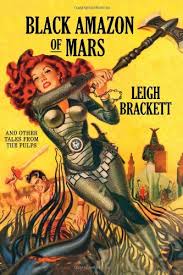 Bill: I really like the weed-knife on the front of the boat; details like that are what sell an exotic setting. Green-skinned dancing girls, little dragons, names like The Palace of All Possible Delights and The Ocean-That-Is-Not-Water, all work to suggest a world without the need for reams and reams of elaboration. Of course, the length of the piece is a big factor as to why this approach works so well, but I do wish some modern fantasy writers would dial back the “details-for-details’-sake” aesthetic and take a page from writers like Brackett who cut their teeth in magazine fiction. Not everyone needs to be Tolkien.
Bill: I really like the weed-knife on the front of the boat; details like that are what sell an exotic setting. Green-skinned dancing girls, little dragons, names like The Palace of All Possible Delights and The Ocean-That-Is-Not-Water, all work to suggest a world without the need for reams and reams of elaboration. Of course, the length of the piece is a big factor as to why this approach works so well, but I do wish some modern fantasy writers would dial back the “details-for-details’-sake” aesthetic and take a page from writers like Brackett who cut their teeth in magazine fiction. Not everyone needs to be Tolkien.
Howard: She does get the setting across quickly, doesn’t she? The setting, and the atmosphere. Overlaid across it all is the fear of the Moonfire itself. Will they get there? What will happen when they do? It’s all just about perfectly paced. Nothing comes easily — everything is earned. For instance, even though Heath makes a compelling argument to Broca once he’s trying to leave, the barbarian may seem convinced, but he’s still willing to kill. Heath has to fight his way out, threatening the only thing that Broca holds dear.
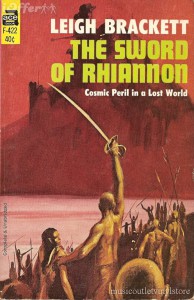 Bill: All of which is set up earlier in the personalities and conflict between the characters. Having the fantastical, created worlds of the Moonfire reflect the psychology of the characters, and hinging the story on that, is why the ending resonates so well. Broca is the only one looking for power, his created world an extreme version of barbarian chiefly splendor. Heath’s desire has always been love — he was willing to die alongside the mere image of his lost Ethene, his drugged stupor in the beginning of the story the flipside of whatever virtual world he could create for himself in the Moonfire. Alor is seeking the same thing, after a life of being used and possessed, but never loved. It’s only that desire that lets them reject the temptation of godhood, the realization that their own act of omnipotent creation isn’t a substitute for real love and real life.
Bill: All of which is set up earlier in the personalities and conflict between the characters. Having the fantastical, created worlds of the Moonfire reflect the psychology of the characters, and hinging the story on that, is why the ending resonates so well. Broca is the only one looking for power, his created world an extreme version of barbarian chiefly splendor. Heath’s desire has always been love — he was willing to die alongside the mere image of his lost Ethene, his drugged stupor in the beginning of the story the flipside of whatever virtual world he could create for himself in the Moonfire. Alor is seeking the same thing, after a life of being used and possessed, but never loved. It’s only that desire that lets them reject the temptation of godhood, the realization that their own act of omnipotent creation isn’t a substitute for real love and real life.
Howard: It would have been a mis-step to have another physical confrontation as the last challenge, once they finally escape the Moonfire; instead we get a fantastic social conflict, one of the most memorable scenes in the story, when Vakor and the Children of the Moon can see that the Moonfire has transformed Heath and Alor.
More deeply, it’s love that transformed them, burning off the dross and making them pure. It was what allowed them to survive their terrible ordeal within the Moonfire, and at a deep level this story is all about love and its ability to bring out the best in us.
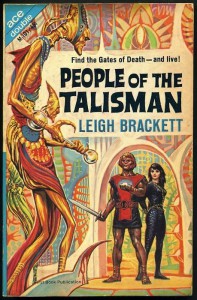 Bill: And that the notion of omnipotence is perhaps an illusion — all the power in the Moonfire could not make Alor love Broca, after all; and nothing but love could make Heath reject the seductive power of absolute creation. In the end, the world Heath and Alor share in happiness is a reflection of the artificial one Heath nearly loses himself to in the Moonfire, with the profound difference that it is not a mere shadow of his desires, but a shared reality not dependent on his will.
Bill: And that the notion of omnipotence is perhaps an illusion — all the power in the Moonfire could not make Alor love Broca, after all; and nothing but love could make Heath reject the seductive power of absolute creation. In the end, the world Heath and Alor share in happiness is a reflection of the artificial one Heath nearly loses himself to in the Moonfire, with the profound difference that it is not a mere shadow of his desires, but a shared reality not dependent on his will.
Howard: If there are any flaws here, they’re only those we impose upon a story looking back on it decades after its creation. There’s some idle hand waving about a scientific explanation of what the Moonfire is and a discussion of “radiation.” Why not? It’s really just a stand-in for an explanation that would have been given as sorcery in a modern fantasy tale. (And really, this is nothing BUT fantasy, held tenuously to the science fiction field because he’s a man from Earth and this is “Venus.”) I always find it a little jarring that Alor simply tells Heath that she loves him, and then remind myself that these are blunt people in stressful situations, and then it feels not the least bit forced.
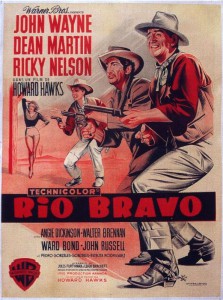 In a society of the far future we can suppose that flyers and space ships could have easily reached the location of the Moonfire and explored and explained it, but we’re not really given a sense of how sophisticated our world travelers and their instruments are, or what taboos might be in place to keep such expeditions away.
In a society of the far future we can suppose that flyers and space ships could have easily reached the location of the Moonfire and explored and explained it, but we’re not really given a sense of how sophisticated our world travelers and their instruments are, or what taboos might be in place to keep such expeditions away.
Bill: I suspect Brackett could just as easily supply an explanation that it is the radiation that destroys a ship’s ability to explore the Moonfire. But really, as you say, this is fantasy adventure from the days before genre stringency and NASA data cut the legs out from under planetary romance. We hear very little about science fictional ideas here. It’s barbarians and gods and unknown powers that the story concerns itself with.
Howard: I had a great time re-reading this. I’m starting to realize that my ability to read quickly has sometimes impaired my ability to truly savor. When I slow down and soak up the words I think I enjoy the text and learn more from it. I had remembered that this was a good story, but I’d forgotten most of the details. Now that I took my time with this third visit, I think many of them are stuck for good, and I look forward to re-reading more. Bill and I will be visiting Brackett’s work over the course of the next year, shortly after we finish our Conan re-read.
Here’s a fine retrospective of her life and work. I’ll be linking to additional Brackett celebrations through the course of the week.
21 Comments